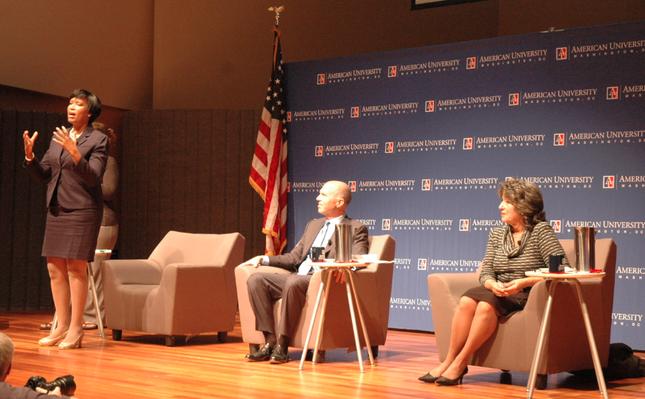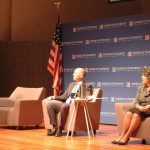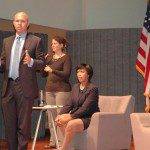First of 4 Mayoral Debates? Predictable, Not So Fresh
By • September 19, 2014 0 1186

Finally, there was a debate, and just in the nick of time, what with only a little more than a month left before voters decide who is going to be the next Mayor of the District of Columbia.
You might cherish the memories you have of this debate, held at a Katzen Hall auditorium at American University, given that front-runner in the polls Ward 4 Councilmember Muriel Bowser, who won the Democratic Primary and has a hefty lead in the polls over challengers has said flatly that she will participate in only four debates, including Thursday’s affair at AU.
She is being challenged by Independents David Catania, a prominent at-large District councilmember, and former councilmember and frequent mayoral candidate Carol Schwartz, bidding to be back all the way after a six-year absence from the political and electoral scene.
It’s been months since Bowser won the primary over incumbent Mayor Vincent Gray—still under the shadow of suspicion for his 2010 campaign—and other challengers including Ward 2 councilmember Jack Evans and Ward 6 councilmember Tommy Wells. During that in-between time, there have been no candidate forums, a lot of posturing and position statements, the arrival of Schwartz bidding for a political comeback, Bowser going hither and yon throughout the community—and sometimes the country—and Catania delivering position statements and being a very active councilmember and producing a 126-pages position booklet, detailing his proposals for how he would govern the city.
There’s been a great deal of anticipation about the first debate, and the possibility that it might be a volatile affair.
Bowser was buoyed by the news of a hefty lead over her rivals in a Washington Post-NBC News-Marist poll which came out the day before and had 43 percent of likely D.C. voters favoring Bowser, with 26 percent for Catania and 16 percent for Schwartz. Catania has questioned the poll, saying an in-house poll of his campaign showed the race to be much closer.
The so-called debate—billed as a conversation with the candidates—was moderated by NBC newsman Tom Sherwood, a veteran of such affairs and included a panel of Washington Post political writer Clinton Yates and WAMU reporters Patrick Madden and Kavitha Cardozo.
Sherwood, at times, took on the aspects of a no-nonsense and sometimes frustrated cowboy, herding and snapping a whip, as he tried to make both the candidates and the audience behave. He had little patience for excessive clapping, candidates interrupting each other or breaking the time limit, although the candidates, as they are wont to do, did just that and often.
It’s fair to say that nobody won this affair, and that nobody was mortally wounded either. Verbal shots were fired to be sure, and some of them even nicked their targets. Much of what happened was predictable, and the fresher aspects and revelations, while unexpected, were not of the “Stop the presses or put it on Twitter” kind.
Bowser, in basic black and pearls, came on strong and confident, offering to lead securely a changing city that was financially well off, promising that everyone would benefit and that in a boom town, nobody should and would be left behind. Catania in quite the blue suit, stood up every time he talked, while Schwartz and Bowser sat. He presented himself as the man with the experience, the man who had done more for education and made more education legislation than anyone else, while painting Bowser as a legislative light weight, which she vehemently denied. Schwartz in her own inimitable style—down to earth, warm, but also tough when need be—recalled that she was an education champion long before anyone else, that she was for the worker and took positions which in the end cost her her job. “I knew it wasn’t politic to do that, but I did it anyway,” Schwartz said.
Yet who knew Catania, for instance, has never gone to a Nationals baseball game, even though he was once a left-handed second baseman? Catania fought the battle against the baseball team and stadium because “I didn’t think it was a good deal to have the owners pay nothing and the city everything.” Bowser suggested that the reason Catania did not go to a game was that he was still angry about losing the fight. “It kind of speaks to his temperament,” she said.
Bowser complained that Catania was trying to take credit for everything. “Next thing you know he’ll take credit for the blue skies and rolling seas,” she said.
Other odd things came up. Yates asked in the interests of finding out something new: “If you had to give up your car, how would you travel in the city—Metro rail, bus or bicycle?” Bowser said she loved and preferred to travel by bus, Catania and Schwartz would take the Metro. “Let me get this straight,” Yates asked. “No bicycles?”
It was a strange reaction, given that there’s been quite a bit of controversy about a veritable boom in bicycle use and rentals. “I think it’s a great thing, and I believe in a growing transportation system in which everyone obeys all the laws, stops for stop signs and red lights,” Schwartz said.
They were asked—by Yates again—what one book they would have students read. Bowser suggested Barack Obama’s “The Audacity of Hope.” Catania said, “I wouldn’t want to tell a student what to read. I’d want them to make their own choice.” Schwartz chose Charles Dickens’s “A Tale of Two Cities,” which she felt resonated in this city, which has yet to become one city. This is the book that begins with “It was the best of times, it was the worst of times,” which in this town is always true.
Round one of four rounds had its entertainment values and its informational rewards, but as a brawl, nobody walked out limping.
- Mayoral candidate Muriel Bowser on stage at the Katzen Center at American University. | Bill Starrels



